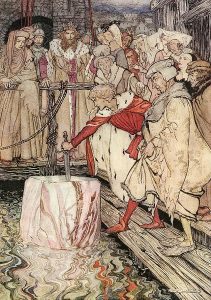
In the cold northern hemisphere, it’s the shortest day of the year. The long nights of a wintry season have always provided ideal opportunity for a community’s storytellers to spin their stories of historical figures, folk and fairy tales, as their listeners sat spellbound around a flickering fire.
Though the light now comes from my computer screen, I am no less enthralled by the stories of King Arthur, told in a library Great Course by Dorsey Armstrong. After the Romans left Britain, Arthur was the courageous leader who turned back the Anglo-Saxon tide invading from the east, around 4-500 AD. No one can really tell how many of these legends are fact, or whether they’ve been added to or exaggerated over time. Many of them have fantastical elements that stretch our credulity, but we still lean forward to listen, get caught up in their danger and suspense.
Our local Elgin Writer’s Guild hosted Kayla Geitzler as our virtual writer-in-residence this past fall. Especially interesting was the workshop on (Re)Telling Your Own Fairy Tale. Admittedly, I am someone who took a whole course on Cinderella as part of my English studies. These stories have survived, been handed down, because their message rings true. They often favor the vulnerable and the underdog, and highlight the importance of the details of our lives. Words can be charms, spells, or curses. Objects can be magical. Heroes are sent on quests, must pass some kind of test, or resist strong temptation.
In the years when my work was housecleaning, I often felt that, like Cinderella, I was missing out on a glamorous ball somewhere. At that time, the Prins in my life was working for a shoe company called Tender Tootsies. We used to joke about his deliveries of soles and heels. So there was a visceral recognition when Kayla noted that fairy tale themes often include feet and shoes. And who’s to say that fairy godmothers aren’t present? Perhaps they exist in our very genes.
As in folk tales, words and kind actions are still magical today. They can make a great difference in someone’s life. In his discussion of addiction, Gabor Mate writes, “there are also many subtle, invisible (factors) that may positively influence our psychic strength and our capacity for choice: a kind word spoken long ago, a fortuitous circumstance, a new relationship, a flash of insight, a memory of love, a sudden opening to faith.” We not only live our own mythical lives, but participate in the stories of others.
Sometimes the darkness can be too difficult to navigate alone. We need to gather, in whatever way possible, to give and receive from others, whether they are people in our lives or people who lived long ago. We need the cautionary tales, the admonitions to pay attention to the circumstances of our lives, the mirroring to confront ourselves.
Stories have many different facets that we comprehend only after returning to them again and again. They open up their insights as we ourselves change. And our story reveals itself as part of a much greater story.
“Every man’s life is a fairy tale written by God’s fingers.” Hans Christian Andersen